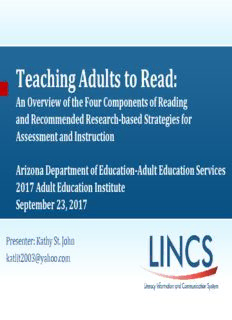
Teaching Phonemic Awareness to Adults PDF
Preview Teaching Phonemic Awareness to Adults
Teaching Adults to Read: An Overview of the Four Components of Reading and Recommended Research-based Strategies for Assessment and Instruction Arizona Department of Education-Adult Education Services 2017 Adult Education Institute September 23, 2017 Presenter: Kathy St. John [email protected] Workshop Goal This workshop is designed to increase your awareness, knowledge, and use of research- based practices for adult reading assessment and instruction for the 4 components of reading: alphabetics ▪ fluency ▪ vocabulary ▪ comprehension ▪ The Workforce Innovation and Opportunity Act (WIOA) WIOA focuses on the important role that strong basic skills play in adults’ ability to: attain a secondary school diploma ▪ transition to postsecondary education and ▪ training secure employment ▪ The law specifies that “the essential components of reading instruction” be incorporated into instruction. The Workforce Innovation and Opportunity Act (WIOA) The learner must be: assessed in all four components of reading ▪ provided with appropriate instruction based on ▪ the results of their individual diagnostic and formative assessment Reading components are the foundation of the ultimate goal of helping students learn from challenging, complex texts in postsecondary education and training and for lifelong learning. The Components of Reading Alphabetics: The use of letters in an alphabet to represent spoken words Phonemic Awareness: Knowledge of speech sounds Word Analysis (Phonics plus): Letter-sound knowledge Fluency: Ability to read with speed, accuracy, ease, phrasing and expression Vocabulary: Knowledge of word meanings Comprehension: Understanding a text, or “constructing meaning” Reading is More than Comprehension Alphabetics What is Alphabetics? The skills of phonemic awareness and ▪ decoding What is Phonemic Awareness? Phonemes- the smallest units of sound in spoken language Phonemic awareness- the ability to perceive individual sounds within words Must be learned through reading and writing—it is not just acquired naturally Adult nonreaders have no phonemic awareness Phonemic Awareness This isn’t a hearing issue. It’s a perception issue. Some people can hear the words but don’t perceive the individual sounds. Rug = /r/ /u/ /g/
Description: